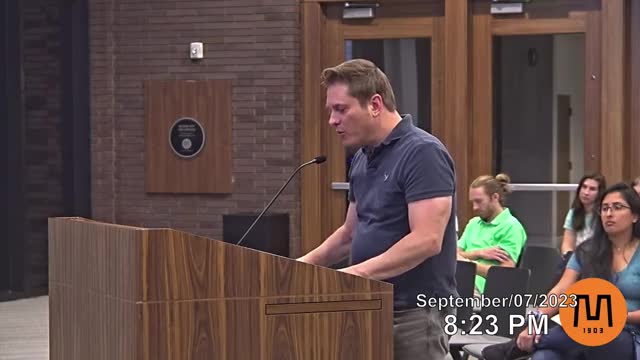Community Voices Rise Against Proposed Concrete Plant
September 07, 2023 | Murray , Salt Lake County, Utah
This article was created by AI summarizing key points discussed. AI makes mistakes, so for full details and context, please refer to the video of the full meeting. Please report any errors so we can fix them. Report an error »

In a recent government meeting, community members voiced strong concerns regarding a proposed conditional use permit for a concrete batch plant near the Humane Society of Utah. The discussions highlighted significant apprehensions about potential health risks, particularly related to dust and noise pollution, which could adversely affect both the local community and the animals housed at the facility.
Alex Van Diver, a local lawyer, emphasized the importance of adhering to city code requirements for granting the permit, which stipulates that the proposed use must not be detrimental to health, safety, or property values. Van Diver pointed out that the planning staff's report lacked sufficient evidence to support the permit, particularly noting the absence of a dust mitigation plan, which he argued should be a prerequisite for approval.
Support for the concrete plant was expressed by Jack Cortez, a nearby property owner, who praised the plant for improving the area by reducing crime and enhancing cleanliness. However, this perspective was countered by multiple speakers, including Tim Williams, a board member of the Humane Society, who likened the facility's proximity to a medical clinic, stressing that planning commissions typically do not authorize industrial operations near health-related facilities.
Dr. Timna Fishbein, the medical director at the Humane Society, raised alarms about the potential health impacts of silica dust on both animals and humans, citing studies that show dust particles can travel significant distances. She urged the committee to consider the broader implications of air quality and noise pollution, particularly given the increasing number of residential developments nearby.
Community members also highlighted the ongoing shortage of animal welfare resources, arguing that the welfare of animals should take precedence over industrial interests. Linaya Scott, a local resident, underscored the need for safe environments for animals, stating that concrete can be sourced elsewhere, but the lives of animals are irreplaceable.
As the meeting concluded, the committee was urged to carefully weigh the health implications and community concerns before making a decision on the permit, with many calling for stringent conditions to ensure the protection of air quality and animal welfare.
Alex Van Diver, a local lawyer, emphasized the importance of adhering to city code requirements for granting the permit, which stipulates that the proposed use must not be detrimental to health, safety, or property values. Van Diver pointed out that the planning staff's report lacked sufficient evidence to support the permit, particularly noting the absence of a dust mitigation plan, which he argued should be a prerequisite for approval.
Support for the concrete plant was expressed by Jack Cortez, a nearby property owner, who praised the plant for improving the area by reducing crime and enhancing cleanliness. However, this perspective was countered by multiple speakers, including Tim Williams, a board member of the Humane Society, who likened the facility's proximity to a medical clinic, stressing that planning commissions typically do not authorize industrial operations near health-related facilities.
Dr. Timna Fishbein, the medical director at the Humane Society, raised alarms about the potential health impacts of silica dust on both animals and humans, citing studies that show dust particles can travel significant distances. She urged the committee to consider the broader implications of air quality and noise pollution, particularly given the increasing number of residential developments nearby.
Community members also highlighted the ongoing shortage of animal welfare resources, arguing that the welfare of animals should take precedence over industrial interests. Linaya Scott, a local resident, underscored the need for safe environments for animals, stating that concrete can be sourced elsewhere, but the lives of animals are irreplaceable.
As the meeting concluded, the committee was urged to carefully weigh the health implications and community concerns before making a decision on the permit, with many calling for stringent conditions to ensure the protection of air quality and animal welfare.
Don't Miss a Word: See the Full Meeting!
Go beyond summaries. Unlock every video, transcript, and key insight with a Founder Membership.
✓
Get instant access to full meeting videos
✓
Search and clip any phrase from complete transcripts
✓
Receive AI-powered summaries & custom alerts
✓
Enjoy lifetime, unrestricted access to government data
30-day money-back guarantee


